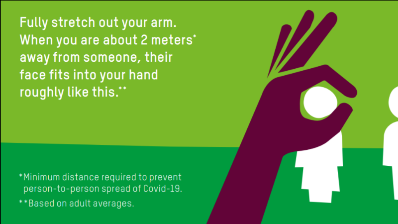Gender Equality Mainstreaming Digest – May 2020 Issue
Here are the highlights of this month’s Gender Equality Mainstreaming Digest! Click HERE for the full version.

Physical distancing guideline during Covid-19 pandemic. Source: Oxfam Digital Repository https://oxfamilibrary.openrepository.com/.
Highlights:
Opportunities and Upcoming Events:
Many events are being cancelled or re-scheduled at the last minute due to the Covid-19 pandemic. Please check each organization’s website or its social media site for up to date information.
Conference of Canadian Coalition of Women in Engineering, Science, Trades and Technology (CCWESTT)
The Canadian Coalition of Women in Engineering, Science, Trades and Technology (CCWESTT) is Canada’s premier national, non-profit organization of groups, institutions and industries with a mission to expand the attraction, retention, and promotion of women.
The 18th Biennial Conference of the Canadian Coalition of Women in Engineering, Science, Trades and Technology (CCWESTT) will be held in Winnipeg on November 12 to 14, 2020 at the RBC Convention Centre.
The mission of the CCWESTT 2020 conference is to provide keynote speakers, sessions, and workshops that represent all areas of SETT and all stages of career advancement. This year’s conference theme is Future Forward: Engage. Advance. Inspire.
This Month’s News:
Bridging the gender gap in the clean energy sector to win the race against climate change
In addressing climate change, we must also address gender inequality. To be successful in our responses to climate change, we must fully include girls and women and take into account their experiences and potential. Women’s empowerment, including economic empowerment through clean energy, must be a core part of the transition to a zero-carbon future and climate-resilient societies. Many Energy 4 Impact initiatives are women-focused to promote women’s involvement and ensure they are at the forefront of the clean technology revolution.
What Other Sectors Can Show for Women’s Leadership in COVID-19
How can we ensure transformative social changes that will enhance women’s representation, in real time, when crisis hits? Public health emergencies, climate shocks, and conflicts of the past have shown how women, who are often central to crisis responses on the ground, tend to be sidelined in the formal institutions of power that follow an emergency.
- Women’s leadership on boards has even been linked to greater environmental sustainability and corporate social responsibility.
- Work to reduce gender inequality in business can also provide some lessons for the public health sector. Research from Foreign Policy Analytics recently found that the inclusion of women in senior positions in traditionally male-dominated industries contributed to profitability, reduced environmental impacts, and boosted corporate social responsibility.
- Building a pipeline of skilled women through investing, for example, in girls’ education in science, technology, engineering, and mathematics (STEM), can be critical tools for supporting women in business.
Reports Publications and Resources:
Gender and gender data as they relate to COVID19 preparedness and response
With the help of partners and friends, Data2X has compiled a running list of resources and current reporting on gender and gender data as they relate to COVID19 preparedness and response around the world, including the current and anticipated impacts of the pandemic. This list is not exhaustive and intended for all to use.
Gender and COVID-19: Where Can Research Help?
While the mortality rates for men are higher, women are disproportionally affected by the social and economic impacts of the pandemic. Indeed, there is evidence that pandemics affect men and women in different ways, and COVID19 is no different.
- Women are facing higher risks of infection compared to men due to their large numbers in the health sector.
- The care work burden which disproportionality falls on women has increased with the pandemic. In addition to women making up most of health-care workers, women are overwhelmingly the primary caretakers in their families.
- As schools have closed, as COVID 19 measures, which require services and activities mainly done by women, such as requirement for water, women have found themselves with a bigger workload.
- Gender based violence has increased as families find themselves in lockdowns with low economic security and feeling of helplessness.
- Gender based violence has increased as families find themselves in lockdowns with low economic security and feeling of helplessness.
OPINION: Autonomous Resourcing: The Engine Room of Feminist Work Amid a Global Pandemic
BRISBANE, Australia, Apr 23 2020 (IPS) – Feminist responses to COVID-19 have been swift, insightful, and numerous. Most strikingly, feminists have mobilized on a massive scale to generate our own autonomous resources for daily acts of solidarity and survival and to respond politically, collectively, and powerfully to this moment.
Many of these actions are coming from within communities and movements in some of the hardest hit and less privileged places, and especially amongst Black, LBTQI+, disability, migrant, land & labour movements. Some of the responses are localised, while others are global. This is ALL autonomous resourcing in action.
But how is this even possible? Amongst all of the personal, political and economic hurdles people are facing with COVID-19 (layered upon the multiple challenges feminist organising already faces), how is it that feminist movements have been inspired and able to achieve this incredible response over such a short term?
The constituencies that feminist movements belong to and serve are worst hit by the pandemic, so there is an urgent need for feminist analysis, solidarity actions and responses. As Women’s International League for Peace and Freedom (WILPF) has noted: “The ability to isolate, work from home, homeschool your children, stockpile your shelves, access healthcare, and financially (and psychologically) put your life back together after the pandemic is class, gender, race, age, and geography dependent”.
